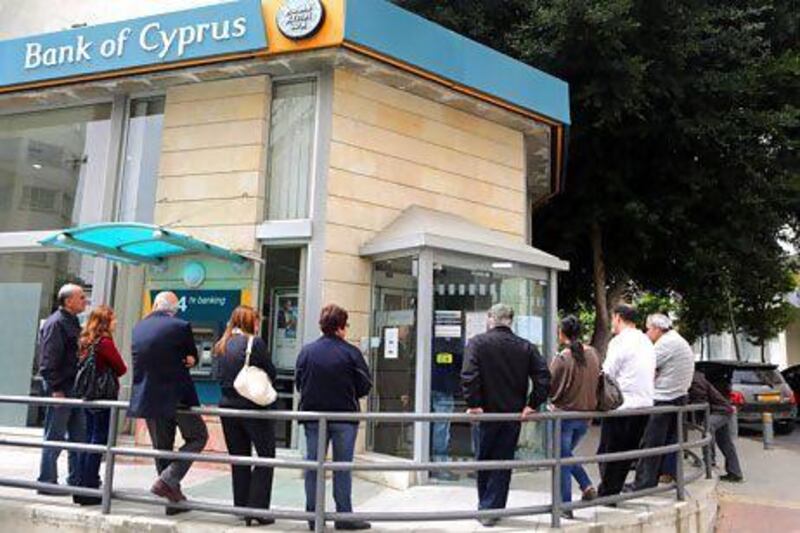The dust is settling after the European Union's bailout of Cyprus, but bankers say a proposed levy on depositors has done lasting damage to investors' confidence in the euro zone's banking sector, especially in those countries with shaky public finances.
Some bankers are even going so far as to recommend that their wealthy clients diversify their deposits among banks - a strategy typically employed for market investments - to avoid the risk that they are called on to fund future bank rescues or see their funds penned in by capital controls.
An initial plan to recapitalise Cyprus's beleaguered banks - now scrapped - imposed a 6.75 per cent haircut on deposits below €100,000 (Dh480,713), rising to 9.9 per cent on deposits above €100,000.
The depositor levy was instantly decried as unfair and ultimately voted down by the country's parliament amid fears of causing bank runs. Instead it was agreed that the most troubled banks, Laiki, would close down and customers with more than €100,000 on deposit would lose a substantial portion of their cash.
But the move was "unprecedented" within the euro zone and could have a lasting impact, said Arnaud Leclercq, the head of new markets at Lombard Odier, the Swiss private bank.
"You may wonder who's next," he said, with Italian and Spanish banks also appearing shaky. "You have to go back to basics once again, [to ask] in which bank do I keep my assets, is the bank solid or not. It's a question people have forgotten."
For the Swiss bank's wealthy clients, that means returning to the simple principle of not putting all their eggs in one basket.
"We've advised clients to limit deposits," Mr Leclercq said. "For those who want deposits we have forced them to diversify deposits among certain banks."
Lombard Odier recommends Swiss banks, followed by those in Luxembourg and Germany, but says clients must be "very selective" when depositing with banks in France, the euro zone's second-biggest economy.
For most expatriate savers, diversification is an expensive option, says Keren Bobker, a senior consultant at Holborn Assets and columnist for The National.
"For many people it is not a practical solution," she says. "I would suggest that savers need to consider the financial situation of any country where they put their money and check the investor-protection rules."
The idea that bank deposits are not safe is a troubling one. After all, the minimal rates of return that most savers receive when compared with bonds and equities is a reflection of the fact that cash is the most liquid asset class and least at risk in the event of a market crash.
But Cyprus's bailout overturned the pecking order of who loses out when a bank needs additional capital - which traditionally means that shareholders take the brunt of losses, followed by junior bondholders, senior bondholders, then depositors. Depositors whose funds are covered by guarantee schemes should be most protected.
But such is the anxiety that Wolfgang Schaeuble, Germany's finance minister, was forced to reassure German savers that their deposits were safe last month.
"Cyprus is and will remain a special one-off case," he told Germany's Bild tabloid. "The savings accounts in Europe are safe."
Mario Draghi, the European Central Bank's president, said Cyprus's depositor levy was "no template" for future bank rescues and the initial plan "was not smart", Reuters reported last week.
Divisions were emerging this weekend as the European Union prepared to disburse rescue funds to Cyprus. Eurogroup president Jeroen Dijsselbloem said that the currency bloc was ready to sign off on the initial €10bn bailout plan, despite a request from the Cypriot president for more financial aid, Bloomberg News reported.
Even if Cyprus's situation proves to be unique, the market is still likely to reassess the risk of deposits across the euro zone, said Cesar Perez, the chief investment strategist for Europe, the Middle East and Africa at JPMorgan.
"We believe the Cypriot banking system problem is idiosyncratic and market will differentiate between the specific profiles of different banks," he said. "The bailout has negative implications for banks more than for sovereigns. Weak banks should be affected and should trade accordingly as the risks for bondholders and depositors have significantly increased."
But if markets signal funding difficulties at the euro zone's weaker banks, deposit flight could be exacerbated, Mr Perez added.
"Therefore we believe the choice of bank will be paramount for depositors and the stronger banks will benefit from a 'flight to quality' as a validation of their solid balance sheets," he said.
Other banks have raised concerns that since other euro-zone countries have laws in place to tax deposits, a future rise in levies is a distinct possibility.
Deposit taxes are easy to collect and are likely to become increasingly relied upon by euro-zone countries in lieu of reforms to stimulate their economies, Steen Jakobsen, the chief economist at Saxo Bank, wrote in a note to clients.
"A deposit tax is already in place in Italy and Spain," he said. "Cyprus was a first in many ways, but also an extension of practices already in place."
For Spain and Italy, the deposit taxes in place are less than 2 basis points.
Spain's "tax" is actually nil per cent, with its law imposed to prevent Catalonia from imposing its own ad hoc deposit tax.
But such is the anxiety among bankers that the mere hint of deposit levies elsewhere seems enough to provoke fits of panic - precisely the situation that deposit guarantee schemes were designed to remedy in the first place.





